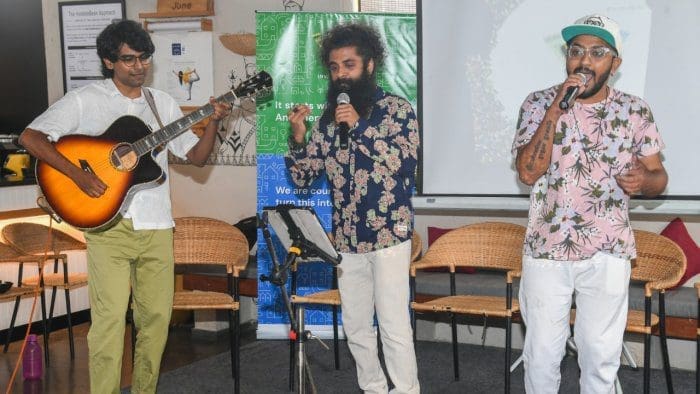
BBC Media Action – Bengaluru, India’s ‘Silicon city’, lays bustling with activity all year round. Be it rain or shine, you’ll always see its people out on the streets. From students to commuters to people selling their wares, you’ll see them all. Amongst the crowds however, there are those who you don’t notice. The ones who go about doing their jobs and trying to make a living, the invaluables. Around 22,500 in number, they act as the backbone of the waste management system in place in the city. Many don’t notice them as they go about their work. Much to the preference of these informal waste pickers, they would prefer if no one give them heed for fear of discrimination. In an attempt to change this and give these workers the much needed help, recognition and benefits they deserve, the BBC Media Action has started a campaign, as a part of the H&M Foundation’s ‘Saamuhika Shakti’ initiative to help change the way the public views the waste picking community.
The campaign
In picture: Vasu DixitThe BBC Media Action’s ‘Invaluables’ initiative unveiled its second stage, #InvaluableRecyclers, with the release of (the) ‘Happy Number’, composed by popular Indian regional and folk singer, Vasu Dixit. The catchy number highlighted the successful efforts and contributions of the waste picking community in keeping a staggering amount of trash away from the city’s already overflowing landfills. The figure, dancing to the tune of 38,32,5000 kilograms, is the amount of waste that is kept away from the landfills mainly because of the effort of these silent environmentalists. By segregating and collecting recyclable plastic items as well as other recyclable material from among waste discarded, the positive effect their work has on the environment is tremendous.
The efforts of the waste picking community is nothing easy. For the recycling process to be effective, the collected materials are sorted into around 35-70 categories before being sent off to respective godowns. The workers segregating the waste are also skilled and experienced and go about their work identifying materials based on appearance, material and thickness, among other characteristics.
Composed by Vasu Dixit, the ‘Happy Number’ is a cheerful attempt to garner attention towards the contributions of the #Invaluables and get them the much needed recognition they deserve. Spearheading the campaign, the ‘Happy Number’ is a creative, musical representation of data compiled that speaks about the work done by the waste picking community.
The existing perception
An analysis of research conducted by the BBC Media Action shows that the public has a negative stance towards the waste picking community. 55% of the respondents found them to be ‘dirty’ in nature and 56% even said they should be refused entry into buildings and societies. The workers claimed that they received no recognition or even acknowledgement for their contributions and were instead met with looks of disgust and even harassment. They did receive some solace when they were given ID cards by the Bruhat Bengaluru Mahanagara Palike (BBMP).
While the formal waste pickers, the ‘Pourakarmikas’ are seen to be more acceptable by the public, the same cannot be said for the informal waste picking community. Receiving next to hostile reactions from the public, the informal waste pickers are often looked down upon. Fearful of harassment and worried for their safety, workers prefer to be shrouded from the public eye and hence tend to avoid people while going about their work . The situation is worse for the female waste pickers. Besides fear of harassment, they have to attend to duties and responsibilities at home as well deal with the problems associated with the nature of work.
Workers are however beginning to see change. With people slowly being made aware of their contributions, they are being accepted more openly. The workers say they are now able to go about more freely without feeling unaccepted by society. The problems they faced before, did not deter them from going about their livelihoods and they even held a sense of pride while doing so.
Change is needed
The phrase, ‘One man’s trash, is another man’s treasure’ is something we often hear. Little do we realise how much it’s true. Trash for us, is treasure for those who make a living off of it. What we call ‘waste’ and discard for no want of it, is something that’s of value to them. It’s what helps them make a living. In reality, they’re no different from the rest of us. They too are just trying to make their way through the problems that the world throws at them, while making a difference at the same time. Yet, despite all the good work done, they receive nothing but harsh judgement. With an emphasis on changing this, the BBC Media Action, along with its partner organisations strive to bring about change and chase away the stigma attached to the waste picking community.
What these invaluable workers need is to be appreciated and recognized for the amount of work they do. Not only keeping the city clean but also contributing to reducing the impact of plastic on the environment, the work carried out by these waste pickers is something that cannot go unnoticed. Be it in Bengaluru or any other city, the manner in which these workers are treated needs to change. Besides changing its perception, the public and authorities need to take action to help them in any manner possible. Much as they consider it their responsibility to keep the city clean, it should be the responsibility of the public to recognize their contributions and treat them with the dignity and respect they deserve. With that thought in mind, it becomes imperative for all of us to pledge towards a positive change. For a world that is more accommodating and does not pass judgement as easily as it is passed now. Appreciating all those who are doing jobs that are invaluable to our society, even if it seems menial. Let’s pledge to make the world a better place for us and our future generations to be living in.




Be the first to comment